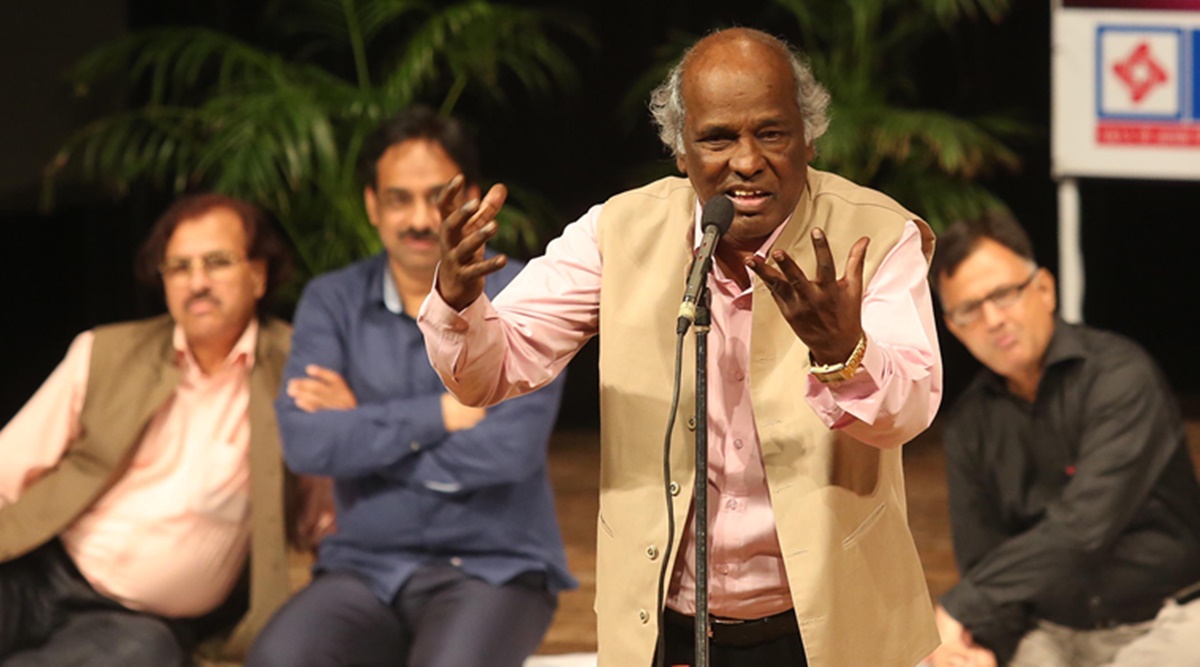 In his early days, Rahat used to perform with Noor Indori, a senior poet from his hometown. He used to sing ghazals at mushairas right from the beginning.
In his early days, Rahat used to perform with Noor Indori, a senior poet from his hometown. He used to sing ghazals at mushairas right from the beginning.The poet who once asked cyclones and storm to stay in their limits succumbed to the coronavirus and passed away in Indore. Rahat Indori earned fame and recognition as an Urdu poet because of his unique style and approach to poetry. Unlike his contemporaries, Rahat was a modern Urdu poet.
Barf ki chattan key talwon mien chhaley kar diye/Gorey Siraj ney hazaro jism jaley kar diye (The white sun blackened manywheatish bodies/It even blistered the ice).
When I think of Rahat, several memories come to mind. While he had been popular in Indore since he started writing, he gained nationwide recognition in the late Seventies when Vaseem Bareilvi noticed his talent.
Bareilvi introduced Rahat time at a mushaira in Muzaffarnagar with the words “A tarannum shikan shayar” ( a poet who can challenge singing). Rahat could indeed beat any popular shaayar with his heavy voice and theatrical performances. These qualities are usually not appreciated in mushairas and purists traditionally compare such performances to “nautanki”.
In his early days, Rahat used to perform with Noor Indori, a senior poet from his hometown. He used to sing ghazals at mushairas right from the beginning. In 1977, when the Janata Party won the election with a thumping majority, he crooned:“Daikhain sapurd e gul ho ke punchey khiza(n) key paas/Ab key chaman gaya hai naye pasba(n) key paas.” (The garden of our country has been taken over by a new gardener/ let’s see flowers bloom or it will be in ruins)
Also read | Goodbye, Rahat Indori
In another instance, the then Member of Parliament from Muzaffarnagar, Sayed Murtaza, while presiding over a mushaira, requested Rahat to sing a ghazal, but he declined. The organisers threatened Rahat — either sing or leave the stage for insulting the chief guest. To everyone’s surprise, he got up and left the stage. While leaving, he said, “Your town is not Hindustan, so don’t invite me. For, I am bound to recite according to my mood.”
Rahat published his poetry in Urdu and Hindi. His collection in Hindi, Mere Baad was as well-received ashis Urdu collections — Lamhey Lamhey, Chand Pagal Hai, Dhoop Bahut Hai, Do Qadam Aur Sahi, Naraz, Maujood, Rut. I believe he could have contributed much more to Hindi and Urdu literature, but he spent most of his time in mushairas and stage performances.
After poetry his second fascination was drinking — Rahat was unable to compose or recite poetry without a drink. As a result, suffered from several chronic health issues including high blood pressure, heart disease and liver problems. In his last years, his eyesight and general condition had considerably deteriorated. Yet, he refused to change his lifestyle or forthright behaviour. Even during mushairas, he was economical in appreciating other poets.
This aspect of his personality is interesting because he never tolerated haughtiness from anybody. Once, a Union minister sat arrogantly while chairing a mushaira and appreciated none of the performances. Rahat recited a couplet addressing him: Aandhi maghroor darakhton ko patak jaye gi/bas wohi shakh bachey gi jo lachak jayegi ( The storm will knock over every protruding tree. only the flexible branches will survive). He also corrected the couplet that the Union minister recited at the inauguration.
Many of Rahat’s compositions have extremely sophisticated couplets, full of emotions and new imagery: Us ki yaad aayi hai sanson zara aahista chalo/dhadkano sey bhi ibadat mien khalal padta hai (O my breath move slowly/I miss her and even a heartbeat disturbs my reverence). He also composed couplets for the general audience: Sabhi ka khoon hai shaamil yahan ki mitti mien/Kisi key baap ka Hindostan thodi hai (Everybdoy has sacrificed blood for the sake of the country, Hindustan doesn’t belong to anybody’s father).
Such poetry was well received by the people, but never got recognition from critics. That could be the reason nothing has been written on his 50-year poetic career. I feel guilty that even I could not write an article on his poetry despite our 40-year friendship and promises to him.
His contributions to films have been widely recognised I remember once Javed Akhtar, while receiving a Filmfare award for best lyrics said that award should also have been given to Rahat Indori.
In his last days, Rahat wrote profusely on death, as if he was preparing for his demise. He entitled the collection Merey Baad (After me): Ghar sey ye soch key nikla hoon ke mar jaana hai/ab koi raah dikha dey ke kidhar jaana hai. (I have left the home to die, Is there anybody who can guide to that way)
And this couplet has no equal in Urdu poetry:
Do gaz sahi magar ye mri milkiyat to haiaey maut too ney mujh ko zami(n)dar kar diya. (Though it is a small piece of land (grave), yet my death has made me a landlord).
My landlord friend occupied his share of land. He, who was so fond of the natural beauty of his soil that he called his son Satlaj, a river of India.
(Alvi is a writer, poet and critic of Urdu)